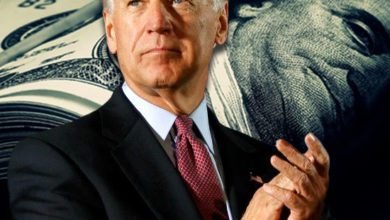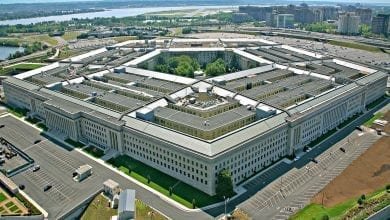Marine Chief Warrant Officer 4 Harold Wilson
During a 30-year career, Marine Corps Chief Warrant Officer 4 Harold Edward Wilson saw action during three major wars. His leadership during the Korean conflict helped his beleaguered unit survive an onslaught by Chinese forces. That bravery under fire earned him the Medal of Honor.
Wilson was born Dec. 5, 1921, in Birmingham, Alabama, to parents James and Leila Wilson. He had three brothers, William, Thomas and Walter, all of whom also eventually joined the Marine Corps.
Wilson earned the nickname “Speedy” as a grocery delivery boy. According to Marine Corps Col. James C. Carroll III, Wilson used a wagon when he first started the job, but he was pretty slow, so people called him “slow poke.” Wilson wasn’t fond of that moniker, so he saved up enough money to get a bike, which he used to speed around town delivering groceries. It earned him a new nickname that stuck with him for the rest of his life.
A few months after the Japanese bombed Pearl Harbor, Wilson enlisted in the Marine Corps Reserve. The 20-year-old was assigned to active duty and spent more than two years stationed on Midway Island in the Pacific before being honorably discharged in the fall of 1945 when World War II was over.
Two years later, Wilson rejoined the Marine Corps Reserve. He was recalled to active duty in August 1950 when war broke out in Korea. His unit, the 3rd Battalion, 1st Marines Regiment, 1st Marine Division, was sent to the peninsula in November 1950. Pretty quickly, they were involved in some of the war’s first campaigns, including the famed Battle of Chosin Reservoir, where Wilson was wounded in December 1950.
A few months later, Wilson earned the Bronze Star for leading his platoon during several skirmishes in March 1951. Then, there was a lull in fighting for a few weeks, but on April 22, about 250,000 Chinese soldiers began their spring offensive. Their push south caused South Korea’s 6th Division to collapse, so U.S. Marine Corps units were sent in to plug the gaps through which the enemy was advancing.
Wilson was the sergeant of his rifle platoon, which was attached to Company G. They were charged with plugging the gap on Hill 902 near the Hwachon Reservoir, just north of the 38th Parallel.
Around midnight on April 23rd, the Chinese overran Company G’s outpost. Wilson’s platoon was forced to defend themselves in hastily constructed foxholes from the heavy mortar, machine gun, grenade and small-arms fire coming at them from the enemy.
Wilson braved that intense fire to help survivors get back to their defensive line. He directed the treatment of casualties, and even though he’d been struck in the right arm and left leg, he refused aid for himself and continued to move through the men in his platoon, encouraging them to keep up the fight.
Not Giving Up
As the attack got worse, Wilson was wounded again, this time in the head and shoulder. But he again refused medical attention and insisted on staying with his unit. He couldn’t use either of his arms to fire a gun, so instead, he went around resupplying his men with rifles and ammunition he’d collected from the wounded so they could continue firing.
After asking his company commander for help several times, the unit was finally issued reinforcements, and Wilson moved them into strategic positions along the defensive line. He then directed their fire until he was blown off his feet by a mortar round.
The explosion dazed and concussed Wilson and caused him to lose a lot of blood, but he still refused to get medical aid. Despite his weakened state, he continued to go from foxhole to foxhole directing fire, resupplying his men and giving them first aid and encouragement.
Thanks to Wilson, his unit was able to hold onto the position by rallying enough times that the enemy finally turned back.
At dawn, when the final attack had been repulsed, Wilson personally accounted for each man in his platoon before finally walking half a mile unassisted to the aid station to get help for himself. He was transferred to Yokosuka Naval Hospital in Japan and spent five months there before being sent back to the U.S.
Nearly a year later, on April 11, 1952, then-Master Sgt. Wilson received the Medal of Honor from President Harry S. Truman during a White House Rose Garden ceremony, which his parents and brothers attended. Two other Korean War comrades, Army 1st Lt. Lloyd Burke and Army Cpl. Rodolfo Hernandez, also received the nation’s highest award for valor that day.
A few days later, Wilson was given the key to the city by Birmingham’s mayor as his bravery was celebrated across his hometown.
That July, Wilson married Julia Sawls. They had two sons, John and Harold Jr., according to the South Carolina newspaper, The State.
An Honorable Career
Wilson earned his commission as a warrant officer in August 1952 and continued to work his way up the ranks for many more years. A decade later, in December 1962, he took over the post of adjutant of the Marine Corps Engineer Schools at Camp Lejeune, North Carolina. A year later, he served in a similar role for the 2nd Tank Battalion.
During Vietnam, Wilson served with Marine Aircraft Group 13 before being assigned as the 6th Marine Corps district personnel officer in November 1968. He retired from the corps in February 1972 after nearly 30 years of service.
Wilson continued to help service members by working as a benefits counselor for the Veterans Administration. In 1974, he moved to Lexington, South Carolina, where he remained for the rest of his life.
Wilson died of lung cancer on March 29, 1998. He was buried in Lexington’s Woodridge Memorial Park Cemetery.
The Marine Corps continues to honor Wilson and his achievements. In 2017, a weapons storage facility was named in his honor at Marine Corps Logistics Base Albany, New York, where Wilson once worked. His son, John, spoke on his behalf at the event.
“Dad was so humble about his accomplishments and being a Medal of Honor recipient,” John Wilson said at the building’s dedication. “He would probably say everybody is making too much [of] a big deal over this. He would probably say there are other people more deserving of having a building such as this named after him.”
John Wilson said his father was a private and humble person but that he would be proud of the honor bestowed upon him.
This article is part of a weekly series called “Medal of Honor Monday,” in which we highlight one of the more than 3,500 Medal of Honor recipients who have earned the U.S. military’s highest medal for valor.
Source: Department of Defense
Content created by Conservative Daily News is available for re-publication without charge under the Creative Commons license. Visit our syndication page for details.




